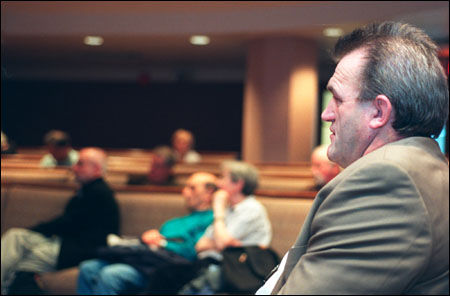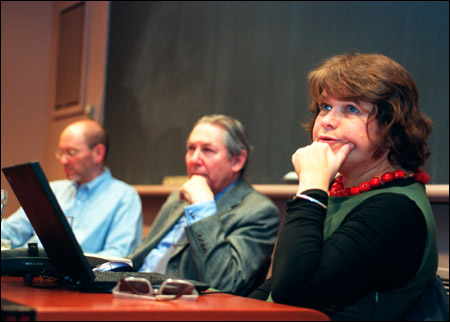Massacre in Jedwabne re-examined at CES
1941 massacre of Polish Jews revisited

Most people in the United States would be hard pressed to find the town of Jedwabne on a map, much less identify anything that happened there.
In Poland, the case is very different. Jedwabne, located in the northeast corner of the country, was the scene of a shocking 1941 massacre in which somewhere between 400 and 1,600 Polish Jews were herded into a barn and burned alive by their Christian neighbors. The event was one that nearly everyone involved agreed to forget until the 2001 publication of “Neighbors: The Destruction of the Jewish Community in Jedwabne, Poland” by Jan T. Gross, a Polish scholar who teaches at New York University.
Gross’ book, based on long-buried documents and interviews with surviving Jews, touched off a national debate on the subject. Some Poles accepted Gross’ research as fact and apologized for the murders, while others questioned his sources or his scholarly methods, and still others dismissed the whole story as a lie, blaming the massacre on the Nazis, who occupied Poland at the time, or said that the Jews had brought the violence on themselves by collaborating with the Soviets, Poland’s previous occupiers.
Poland’s Institute of National Memory conducted an investigation into the event, which largely corroborated Gross’ reconstruction. On the 60th anniversary of the massacre, a ceremony was held in Jedwabne honoring the Jews who died there. Despite these official acknowledgments, however, controversy still rages, with much disagreement about what actually happened and who was responsible.

On May 3, the Center for European Studies (CES) hosted a discussion on the subject, “The Jedwabne Debate Five Years Later,” co-sponsored by the center’s Jews in Modern Europe Study Group and the Institute for Human Sciences at Boston University. The speakers were Anna Bikont, a journalist with Gazeta Wyborcza, Poland’s leading newspaper, and the author of a new book, “My z Jedwabnego” (“We from Jedwabne”), and Antony Polonsky, the Albert Abramson Professor of Holocaust Studies at Brandeis University who has written extensively on the history of Jews in modern Poland. Alex Sagan, a CES affiliate and co-chair of the Jews in Modern Europe Study Group, served as moderator.
Bikont said that after decades of silence on the subject and in the face of persistent Polish anti-Semitism she has been surprised by the willingness of Poles to talk about what happened in Jedwabne and in some cases to offer apologies.
“For someone like me – Jewish by origin and a realist by nature – the discussion that has been taking place in my country about Jewish-Polish grudges and prejudices seems unthinkable,” she said, adding that the debate seems to her like “a huge national psychotherapy session.”
But as in any release of long-suppressed memories and emotions, the outpouring is apt to arouse antagonisms. Bikont paid tribute to people whom she described as “heroes of Jedwabne,” Poles who opposed the violence or who actively helped Jews to escape. Many of these, however, have either remained silent about their good deeds for fear of reprisals or, as in the case of a former mayor of Jedwabne now living in the United States, have been forced into exile by the hostility of their neighbors.
But in spite of frictions within Polish society, Bikont believes that the debate over Jedwabne has tremendously accelerated the study of Jewish-Polish relations.
Polonsky, who has co-edited a book titled “The Neighbors Respond: The Controversy over the Jedwabne Massacre in Poland” (2003), a sampling of writings and interviews related to the Jedwabne debate, praised Bikont’s book for making the context of the slaughter very real and immediate.
“Everybody in the town knew everybody else by their first name.”
But there are important historical questions still to be determined, he said. Among these are the impact on society of the transition from Soviet to Nazi occupation, the possible role of the Nazis as instigators or facilitators of the massacre, and the extent of Polish anti-Semitism at the time.
Beyond the investigation of historical questions, there is the problem of how present-day Poland should react to the coming to light of these horrifying events. Polonsky said he does not believe public apologies by officials serve much purpose.
“Usually the people who apologize don’t have anything to apologize for. What is needed is acceptance, a more nuanced and understanding acceptance of the problem.”
The audience, which numbered only about 30 and included many Polish speakers, participated enthusiastically in the question-and-answer session, displaying much detailed knowledge and personal involvement with the subject. Several people pointed out that during the Nazi era the number of Poles who rescued Jews was greater than for any other nationality, and in view of this positive image it is hard for many Poles to admit that their fellow citizens could have committed such atrocities.
Polonsky added that Poland’s history of successive occupations by neighboring powers contributes to this feeling as well.
“The idea developed that Poland was the Christ of nations. It is a myth that imprisons us. We need a Poland with fewer myths.”




